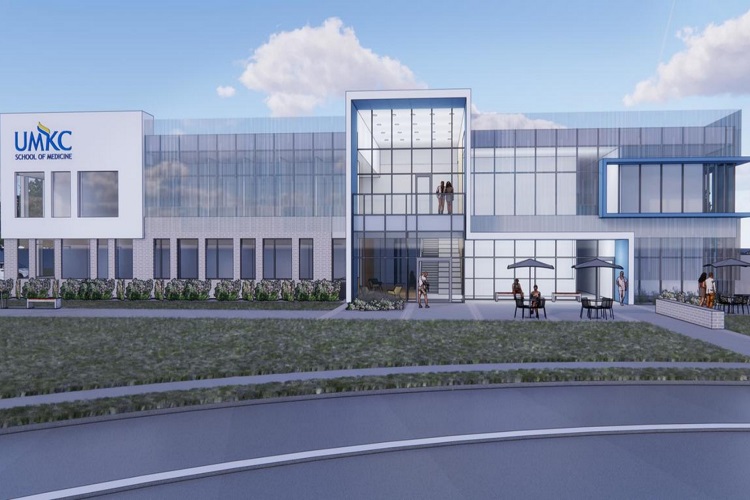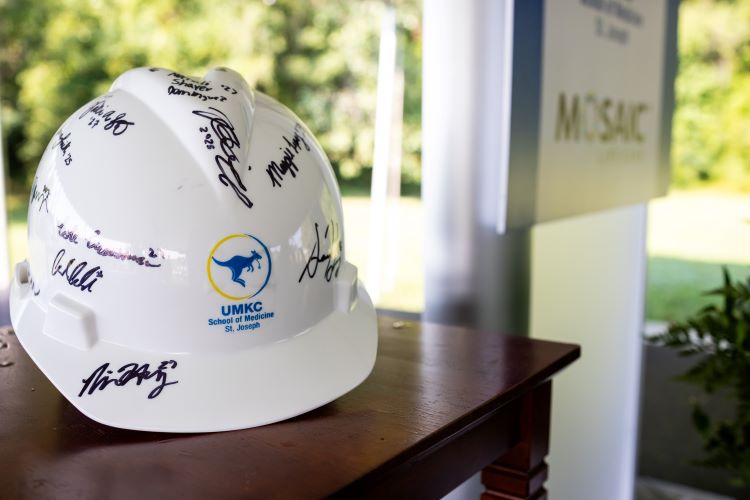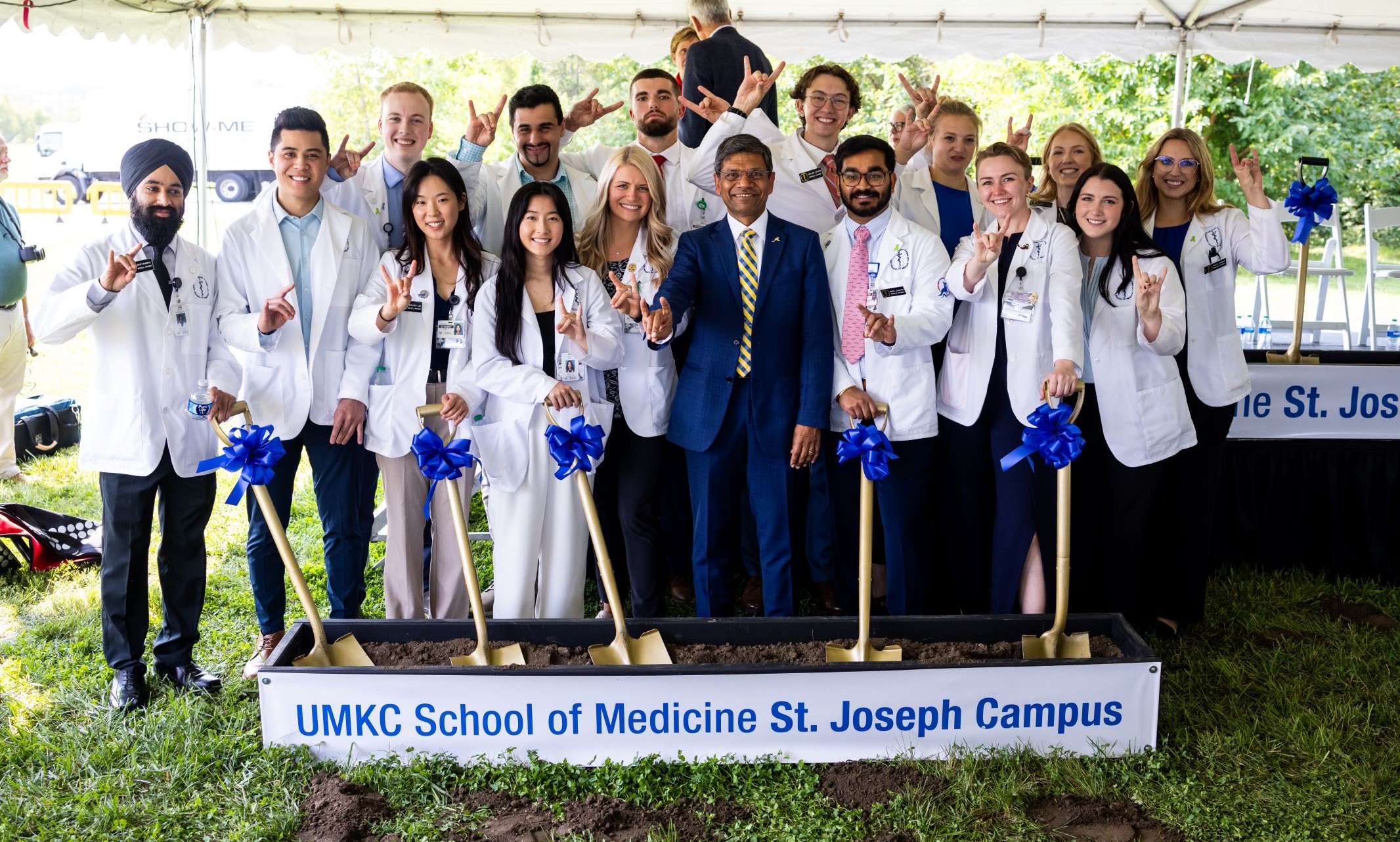The University of Missouri-Kansas City broke ground on a new $14.5 million medical building for its School of Medicine campus in St. Joseph, Missouri.
“Through our investments in the St. Joseph campus, UMKC is answering the call to help ensure all Missourians have access to the health care they deserve,” said UMKC Chancellor Mauli Agrawal. “Today’s groundbreaking ceremony marks a catalyst in our state and region that will be felt for decades to come.”
The 22,000-square-foot building will transform health-care access for Missourians by training future health care providers who are committed to rural medicine, supporting research and providing care to people in St. Joseph and the surrounding area.
The building will feature the latest medical teaching and learning technology. There will be four exam rooms designed to simulate real-world patient interactions and dedicated study and meeting spaces to support student collaboration. It’s expected to open in 2025.

“The physical environment for medical students is important: Using cutting-edge architecture and technological best practices, this new building creates physical spaces that advance active learning, teamwork and interdisciplinary collaboration,” said UMKC School of Medicine Dean Mary Anne Jackson. “This campus will give UMKC the tools to train hundreds of talented medical professionals so that they can go on to provide the highest-quality care to our neighbors throughout Missouri.”
Missouri is facing a severe physician shortage, with nearly half of the rural counties in the state lacking adequate access to hospital health care. Research shows medical students who have experience in rural medicine during their residency programs are more likely to practice medicine in rural settings.
Physicians who practice in rural areas face numerous challenges. They care for a population of patients with increased risk for many conditions compared to urban and suburban patients, Jackson said. These include higher levels of chronic diseases such as COPD and heart failure, addiction and cancer diagnoses. At the same time, rural physicians encounter limited access to needed specialists, including cardiologists, oncologists and addiction specialists.
To help fill health-care gaps, the UMKC School of Medicine partnered with Mosaic Life Care in 2021 to train physicians at its St. Joseph location, but the program has since outgrown its space.
“We are excited to see our partnership with the University of Missouri-Kansas City School of Medicine grow and prosper on our St. Joseph campus,” said Chief Executive Officer Mike Poore, Mosaic Life Care. “We have the opportunity to shape the future of rural health care and address the shortage of physicians in our region. This extended footprint for the UMKC School of Medicine bridges that gap, especially knowing that students training in rural programs are three times as likely to remain in practice in those areas.”
The new building will incorporate design elements to symbolize the statewide impact of the UMKC St. Joseph campus. A large artistic map will be installed near the entryway, pinpointing UMKC medical program partners throughout Missouri and Kansas. This installation is meant to showcase the strength of the existing system and will include the ability for UMKC to add future partners as it expands its rural education network.
So far in three years of the UMKC School of Medicine program in St. Joseph, students have logged 19,764 clinical contact hours in medically underserved areas. In addition to Mosaic, they have practiced in other clinics in St. Joseph, Albany, Cameron, Chillicothe, Maryville and Mound City, Missouri.
Emma Smith is part of the program’s first cohort of students. She said doing rotations in Chillicothe gave her unique experiences in understanding and overcoming barriers to care in rural areas.
“I have learned so much during my time at UMKC, and some of my strongest learning experiences have been during my rural family medicine and internal medicine rotations,” Smith said. “Expanding the UMKC School of Medicine St. Joseph campus is a benefit to the region because it provides additional resources for students to live, work and train in a community with unique patient needs.”
This new medical education facility represented strong support and help from federal and Missouri leaders. Of the total $14.5 million cost, $13 million was designated from federal funds and $1.5 million came from state funding. Former Senator Roy Blunt was instrumental in championing federal funds for the new building in a 2022 spending bill, which also included $2.5 million for the UMKC School of Medicine to expand its behavioral health training at the St. Joseph campus.
"Missouri is facing a physician shortage, creating major challenges for rural communities," Blunt said. "As the former chairman of the appropriations subcommittee that funds the Department of Health and Human Services, I was a strong advocate for the UMKC School of Medicine St. Joseph campus expansion and its important work in training physicians who will be uniquely qualified to provide care where it's needed most. I am glad to see UMKC breaking ground on the new building today that will strengthen our rural communities by providing quality care to families in underserved areas across the state."
In addition to the contributions from Blunt, Missouri State Rep. Brenda Shields was instrumental in the creation of the UMKC School of Medicine St. Joseph campus and spoke at the groundbreaking event.
“It has been exciting to be involved in this project from the very beginning. When I spoke to the students at the first white coat ceremony and heard their passion for rural medicine, it was clear to me we were accomplishing what we set out to do—to bring better health care to rural Missouri,” Shields said. “This school will be the premier location for rural medical training in the United States, and it is right here in northwest Missouri.”

UMKC has a strong history of expanding access to rural health care education programs in Missouri. In addition to the School of Medicine program, the university operates satellite campuses for the UMKC School of Pharmacy at the University of Missouri in Columbia and Missouri State University in Springfield.
Here's what other supporters who spoke at the groundbreaking event had to say:
- “This expansion is a game changer for rural health care in the region," said U.S. Congressman Sam Graves, a sixth-generation family farmer who grew up in northwestern Missouri. "Health-care access in north Missouri depends on the availability of rural doctors. If we want more rural doctors, we need more rural training. I’m thrilled that UMKC and Mosaic have come together to make this happen in St. Joseph and I can’t wait to see the impact this will have on north Missouri.”
- “This is a textbook case of how our communities and the University of Missouri System should be collaborating," said Michael Williams, chair of the Board of Curators. “These partnerships will lead to improved health care across the state, and that means a better quality of life for every Missouri citizen.”
- “This project is a tremendous example of how the University of Missouri System is transforming our state’s critical workforce and supporting rural health,” said University of Missouri President Mun Choi. “The new campus will increase access to essential care for all Missourians while preparing the next generation of providers to serve close to home and address the shortage of rural health care providers.

